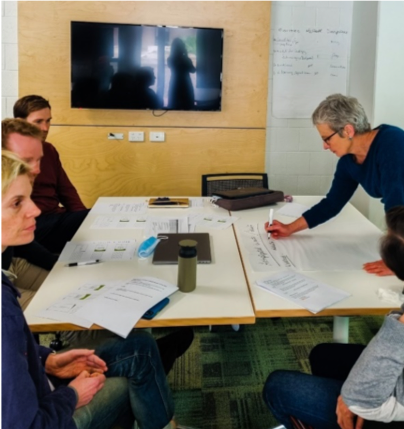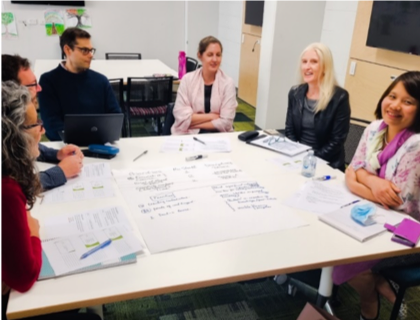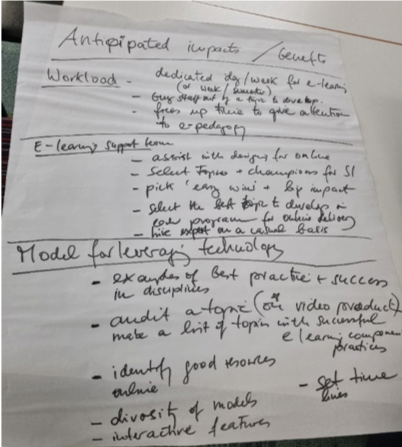On 16 November, 17 academic staff from 8 disciplines at CHASS brainstormed actionable answers to this question during a HASS Academy workshop, facilitated by the Digital Education Working Group (DEWG). Following a presentation of key findings and 13 recommendations from the focus group research completed by DEWG, the participants were invited to provide feedback on the results and workshop the priorities they would like addressed first, why, and how.
This post reports on the workshop activities, outcomes, and next steps.
Digital Education in HASS: Workshop held on 16 November 2021
What will digital education at CHASS look like in 2022 and beyond?
On 16 November, 17 academic staff from 8 disciplines at CHASS brainstormed actionable answers to this question during the HASS Academy workshop, facilitated by the Digital Education Working Group (DEWG).
Since its establishment in October 2020, the group has developed the high-level Digital Education Plan, discussed with staff at a College-wide online forum in November 2020, and has undertaken internal research to inform the College strategy for 2022-2023. The group members carried out focus groups with 8 disciplines and 38 teaching staff to understand staff perspectives on, experiences with, and plans for digital education across the College.
Following a presentation of key findings and 13 recommendations from the research report distributed in September 2021, the participants were invited to provide feedback on the results and workshop the priorities they would like addressed first, why, and how.

The workshop was organised around 3 activities.
To acknowledge the diversity of discipline-level needs, staff were first asked to individually select one top priority as most critical for the success of teaching in their discipline in S1 2022, using the DVF problem ranking framework from design thinking:
- Desirability (how the chosen priority will enable the discipline’s ability to deliver quality learning experiences)
- Feasibility (technological and organisational viability)
- Viability (financial viability)

Among those individually identified, the following list of priorities emerged, in the order of significance to the workshop participants who discussed them in small groups:
- Workload allocation
- Point-of-need, predominantly e-learning, support for technology enhanced learning
- Models for leveraging technology; FLO improvements; and investment in unsupported technologies
- Online study skills foundation course and facilities for hybrid teaching

The staff were also invited to brainstorm in small groups why it is important to action those priorities (most significant anticipated impacts) and how (suggested actions). Some of the ideas exchanged, included:
Declare a dedicated day per week or week per semester for digital learning (when there will be no teaching, no meetings, or other scheduled activities).
Establish structure at course/discipline level where topic coordinators meet regularly and work together to identify common problems and goals and coordinate efforts.
Select one topic per program for online delivery to allow student flexibility (topics where skills and knowledge can be effectively learned online, and where FTF is not important).
Select topics and champions for development for S1 2022 – large enrolment topics that don’t change much, for easy wins.
Audit a topic where digital (particularly hybrid) education is done well; create a list of those topics and distribute to staff (e.g. on video production).
The remaining time the staff spent viewing and discussing each other’s posters.
Here is what some participants had to say about the workshop:
“The workshop was a fantastic opportunity to discuss some of the most pressing challenges we are facing right now, in terms of digital and online learning. Not only did we manage to identify areas of key concern at the discipline level, but also had fruitful discussions as to mitigating these challenges”.
“I spend a lot of time thinking, fleetingly, of things I would like to do with my on-line teaching, wondering how I might make things more engaging, more effective, more efficient, more fun for my students – and for me. But I struggle to find sustained periods of time to plan and implement those ideas. The workshop gave me time to think and ask questions of colleagues who really know what they are doing. It was so heartening to see a group of academics taking time to sit, talk about teaching and think seriously about how, collectively, we can make things better for our students, our colleagues and ourselves”.
“The workshop was well organised, structured, and informative. It enabled us to quickly and collaboratively get to a list of important priorities. In small groups we discussed the challenges and opportunities ahead around digital education, and everyone was able to share their experiences and ideas. By the end of the session, I felt more confident, informed and part of the planning moving forward”.
What’s next?
This initiative is an import step towards strengthening the College’s digital strategy for which staff participation is essential. The DEWG members are considering holding another workshop in January 2022 to develop a roadmap of the first steps towards the implementation of the Digital Education Plan.
A 5-day block in the year focused on digital education is already under discussion. It has been suggested that the week could include a mix of focused time, collaborative work, and training, kick-starting with the Digital Learning Approaches – https://ienrol.flinders.edu.au/index.php/course/DLDD. The goal of the digital learning design and delivery approaches workshop is to collaboratively develop and document a set of agreed digital learning delivery and design approaches that will be used to guide teaching for a course, discipline, or teaching program. This is a very flexible workshop that can be tailored to the discipline/course, starting with conversations with the course/discipline leads to work out where the teaching team are at and what they might need.

